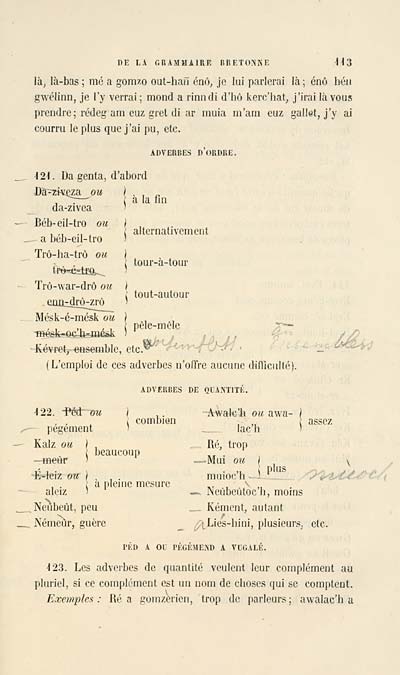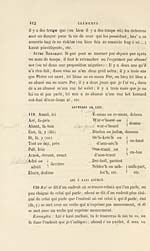Download files
Complete book:
Individual page:
Thumbnail gallery: Grid view | List view

DE LA GRAMMAIRE BRETOîiNE H3
làj là-bas ; raé a gomzo out-haiï énô, je lui parlerai là ; énô béu
gwélinn, je l'y verrai ; mond a rinndi d'hô kerc'hat, j'irai là vous
prendre; rédeg am euz grel di ar muia m'am euz gallet, j'y ai
courru le plus que j'ai pu, etc.
ADVERBES D ORDRE.
■121. Da genta, d'abord
DaTzk^a ou
da-zivea
Béb-eil-tro ou
a béb-eil-tro
Trô-ha-trô ou
Trô-war-drô ou
emirdrô^ô
Mésk-é-mésk ou
TBéafe -Qç'hrnié& k
à la fin
alternativement
tour-à-tour
tout-autour
pèle-môle T^^
Kévret, ensemble, etc.^ ■ Ox^^^^^'tH' .
(L'emploi de ces adverbes n'ofTre aucune diOiculté]
ADVERBES DE QUANTlTi:
^22. i¥d ou
pégément
Kalz ou ]
-meùr '
É-leiz ou )
alc'iz i
combien
beaucoup
à pleine mesure
-Awalc'h ou awa-
lac'h
Ré, trop
-Mui ou \
muioc'h • ^
Neubeût, peu
Némeur, guère
plus
Neùbeùtoc'h, moins
__- Kément, autant
^Lie's-bini, plusieurs, etc
^^i^^^^e/
PED A ou PÉGÉMEiND A VUGALÉ.
-123. Les adverbes de quantité veulent leur complément au
pluriel, si ce complément est un nom de choses qui se comptent.
Exemples: Ré a gomzericn, trop de parleurs; awalac'h a
làj là-bas ; raé a gomzo out-haiï énô, je lui parlerai là ; énô béu
gwélinn, je l'y verrai ; mond a rinndi d'hô kerc'hat, j'irai là vous
prendre; rédeg am euz grel di ar muia m'am euz gallet, j'y ai
courru le plus que j'ai pu, etc.
ADVERBES D ORDRE.
■121. Da genta, d'abord
DaTzk^a ou
da-zivea
Béb-eil-tro ou
a béb-eil-tro
Trô-ha-trô ou
Trô-war-drô ou
emirdrô^ô
Mésk-é-mésk ou
TBéafe -Qç'hrnié& k
à la fin
alternativement
tour-à-tour
tout-autour
pèle-môle T^^
Kévret, ensemble, etc.^ ■ Ox^^^^^'tH' .
(L'emploi de ces adverbes n'ofTre aucune diOiculté]
ADVERBES DE QUANTlTi:
^22. i¥d ou
pégément
Kalz ou ]
-meùr '
É-leiz ou )
alc'iz i
combien
beaucoup
à pleine mesure
-Awalc'h ou awa-
lac'h
Ré, trop
-Mui ou \
muioc'h • ^
Neubeût, peu
Némeur, guère
plus
Neùbeùtoc'h, moins
__- Kément, autant
^Lie's-bini, plusieurs, etc
^^i^^^^e/
PED A ou PÉGÉMEiND A VUGALÉ.
-123. Les adverbes de quantité veulent leur complément au
pluriel, si ce complément est un nom de choses qui se comptent.
Exemples: Ré a gomzericn, trop de parleurs; awalac'h a
Set display mode to: Large image | Transcription
Images and transcriptions on this page, including medium image downloads, may be used under the Creative Commons Attribution 4.0 International Licence unless otherwise stated. ![]()
| Early Gaelic Book Collections > Blair Collection > Eléments de la grammaire bretonne > (135) |
|---|
| Permanent URL | https://digital.nls.uk/79047173 |
|---|
| Description | A selection of books from a collection of more than 500 titles, mostly on religious and literary topics. Also includes some material dealing with other Celtic languages and societies. Collection created towards the end of the 19th century by Lady Evelyn Stewart Murray. |
|---|
| Description | Selected items from five 'Special and Named Printed Collections'. Includes books in Gaelic and other Celtic languages, works about the Gaels, their languages, literature, culture and history. |
|---|

